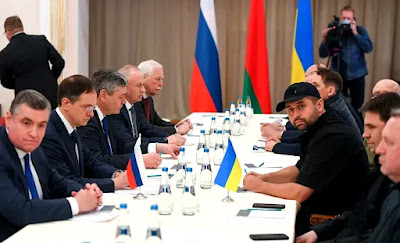Vanuit de Golfgroep * is er een petitie opgesteld aan de Nederlandse regering over de oorlog in Oekraïne. De petitie is ondertekend door een aantal leden van de Golfgroep en door andere mensen, onder wie Hedy D'Ancona (oud-Europarlementariër en oud-minister
van Welzijn, Volksgezondheid en Cultuur), Nout Wellink (econoom en voormalig President van De Nederlandsche Bank) en Bert Wagendorp (columnist en schrijver). Hieronder de petitie en de voorlopige lijst van ondertekenaars.
*) De Golfgroep werd in 1990, voor het uitbreken van de Golfoorlog, opgericht door Aafke Steenhuis, Jan Joost Teunissen, Kiki Amsberg en Joost Smiers. Het is een discussiegroep over internationale politiek van journalisten, wetenschappers, politici en activisten die regelmatig bijeenkomt.
Oproep tot onderhandelen
De
oorlog in Oekraïne, die een lange geschiedenis heeft, is met de Russische
invasie van 24 februari 2022 in een nieuwe fase beland. Hij duurt nu tien
maanden en Oekraïne dreigt te veranderen in een land waarin de bevolking met
kou en honger wordt geconfronteerd dan wel een goed heenkomen moet zoeken in
derde landen.
Ook
in het komende jaar moeten we vrezen voor verdere escalatie van het conflict.
De strijdende partijen lijken niet bij machte een diplomatieke uitweg te vinden
en zoeken hun heil in doorvechten. Toch is een definitieve overwinning van de
ene of de andere partij zo goed als ondenkbaar. Dat betekent dat we dreigen af
te stevenen op verdere escalatie.
Er
is een andere weg denkbaar. Oorlogen die niet tot de overgave van een van de
strijdende partijen leiden worden doorgaans via onderhandelingen beëindigd.
Het
Handvest van de Verenigde Naties (VN) is in het geval van oorlog en vrede het
hoogste internationale recht. De leden van de VN hebben bij de oprichting van
de organisatie de vreedzame beslechting van conflicten tussen staten tot
hoogste gebod uitgeroepen (zie artikel 1.1. van het Handvest). Het feit dat de
Veiligheidsraad van de VN door het vetorecht van de vijf permanente leden in
feite zijn taken niet kan vervullen ontslaat de leden van de VN niet van de
verplichting te streven naar de vreedzame beslechting van conflicten. En de
Nederlandse regering heeft in dezen een bijzondere verantwoordelijkheid:
artikel 90 van de Nederlandse Grondwet luidt “De regering bevordert de
ontwikkeling van de internationale rechtsorde”. Dat betekent in vragen van
oorlog en vrede dat de Nederlandse regering zich conform het Handvest van de VN
sterk zou moeten maken voor onderhandelingen en bemiddeling als weg tot
beëindiging van oorlog.
Onderhandelingen zijn niet onmogelijk. Rusland en Oekraïne hebben in het
verleden vaker onderhandeld, soms ook met succes. Nog in maart en april 2022,
kort na het begin van de Russische invasie, is enige tijd serieus onderhandeld,
waarbij een conceptovereenkomst van vijftien punten op tafel lag. Deze
onderhandelingen werden afgebroken zonder dat een volledig akkoord werd
bereikt. Maar deze ervaringen bewijzen dat onderhandelingen tussen de beide
partijen mogelijk zijn en ook tot resultaat kunnen leiden mits er voldoende
internationale druk wordt uitgeoefend op Rusland en Oekraïne.
Ondergetekenden
roepen de Nederlandse regering daarom dringend op haar grondwettelijke plicht
tot het bevorderen van de internationale rechtsorde serieus te nemen. Dat kan
door zich in EU-verband in te spannen om de strijdende partijen aan de
onderhandelingstafel te brengen, bijvoorbeeld in samenspraak met de
Secretaris-Generaal van de Verenigde Naties António Guterres. Hoe eerder de
wapens zwijgen, hoe beter dat voor alle betrokkenen is – voor de Oekraïners, de
Russen en de rest van de wereld.
Ondertekend door:
Jan Joost Teunissen (schrijver,
directeur van Forum on Debt and Development en filmmaker)
Henk Overbeek (emeritus
hoogleraar internationale betrekkingen VU, en oud-lid van de Eerste Kamer)
Paul Aarts (politicoloog, UvA)
Wendela de Vries (onderzoeker
wapenhandel en wapenindustrie)
Harry van Bommel (oud-lid van de
Tweede Kamer)
Hedy D'Ancona (oud-Europarlementariër en oud-minister van Welzijn, Volksgezondheid en Cultuur)
Nout Wellink (econoom en
voormalig President van De Nederlandsche Bank)
Aafke Steenhuis (schrijfster en oud-redacteur
De Groene Amsterdammer)
Kiki Amsberg (voormalig
VPRO-programmamaker)
Joost Smiers (emeritus hoogleraar
politicologie)
Tanja
Aalberts (hoogleraar Law and Security, VU)
Rita Hendriks
Menno Grootveld (vertaler en uitgever bij Starfish Books)
Bert Wagendorp (columnist en
schrijver)
Jan van der Putten (schrijver en
journalist)
Yvonne Scholten (journalist)
Rob Simons (journalist)
Anne-Ruth Wertheim (onderzoeker
racisme)
Rudi Künzel (historicus)
Adriana Bulnes (historica)
Berend Vis (jurist, RUG, staats/bestuursrecht)
Anton Wessels (emeritus
hoogleraar godsdientswetenschappen, VU)
Theo van der Veen (docent en
vakontwikkelaar economische vakken)
Marie Reehorst (beeldend
kunstenaar)
Corry van der
Pol (voormalig beleidsfunctionaris GGZ)
Peter Quentin Reinsch
(gepensioneerde sociale onderzoeker)
Mieke Goudt
Jesse Bos (oud-gemeenteraadslid
Amsterdam en stadsdeelbestuurder)
Anne van Delft (vertelster, regisseur
sociaal-artistieke projecten)
Liduine J. Michiels van Kessenich
(coördinator voormalig Vredesbureau Midden-Amerika, Pax en IKV)
Pieter Smit
(mensenrechten-onderzoeker)
Marleen Mitzman-Wessel
(onderzoekster financieel toezicht, UvA)
Welmoed Koekebakker (expert mensenrechten en conflict-transformatie)
Renée Smithuis (schrijfster/kunstintermediair)
Jan Nederveen Pieterse (Distinguished Professor Global studies &
Sociology, University of California, Santa Barbara)
Jan Breman (emeritus hoogleraar
sociologie, UvA)
Ewald Engelen (hoogleraar
financiële geografie, UvA)
Jolle Demmers (hoogleraar Conflict Studies, Universiteit Utrecht)
Ineke Jungschleger
(oud-redactrice de Volkskrant)
Elise Koolmees (ecoloog/visionair)
Sander Hoffer (duurzaam bankier)
Bram Grandia (emeritus predikant,
oud IKON-pastor)
Gerhard Scholte (predikant PKN)
Klaas de Jonge (antropoloog en
Afrikanist)
Annette Freyberg-Inan (hoogleraar
International Relations Theory, UvA)
Otto Holman (politicoloog, UvA)
Said Rezaeiejan (politicoloog, UvA)
Jeroen Doomernik (politicoloog, UvA)
Martijn Dekker (docent Conflictstudies, UvA)
Jan Aart Scholte (Leerstoel Global Transformations and Governance Challenges, Universiteit Leiden)
Mariwan Kani (docent Midden-Oostenstudies, UvA)
Peyman Jafari (onderzoeker,
Internationaal Instituut voor Sociale Geschiedenis)
Wiert Wiertsema (senior
beleidsadviseur Both ENDS)
Nikolaos van Dam
(oud-ambassadeur)
Bertjan Verbeek (hoogleraar
internationale betrekkingen, Radboud Universiteit)
Duco Hellema (emeritus hoogleraar geschiedenis van de internationale betrekkeingen, Universiteit Utrecht)
Mouin Rabbani (Co-Editor, Jadaliyya)
Max Arian (oud-redacteur
De Groene Amsterdammer)
Maartje Arian-Schönfeld
Wichers (lerares Frans)
Nana de Graaff (hoofddocent internationale betrekkingen, VU)
Barbara
Giannakos-Teunissen (voormalig medewerker Stichting Buitenlandse Werknemers)
Arie van den Brand (pensionado, landbouwkundig ingenieur)
Pauline Wertheim-van Dillen (gepensioneerd klinisch viroloog)
Corrie Oudhoff (secretaris Multicultural Women Peacemakers Network)
Marjolijn Hohberger (lerares, journaliste)
Anja Meulenbelt (schrijfster, voormalig Eerste Kamerlid)

